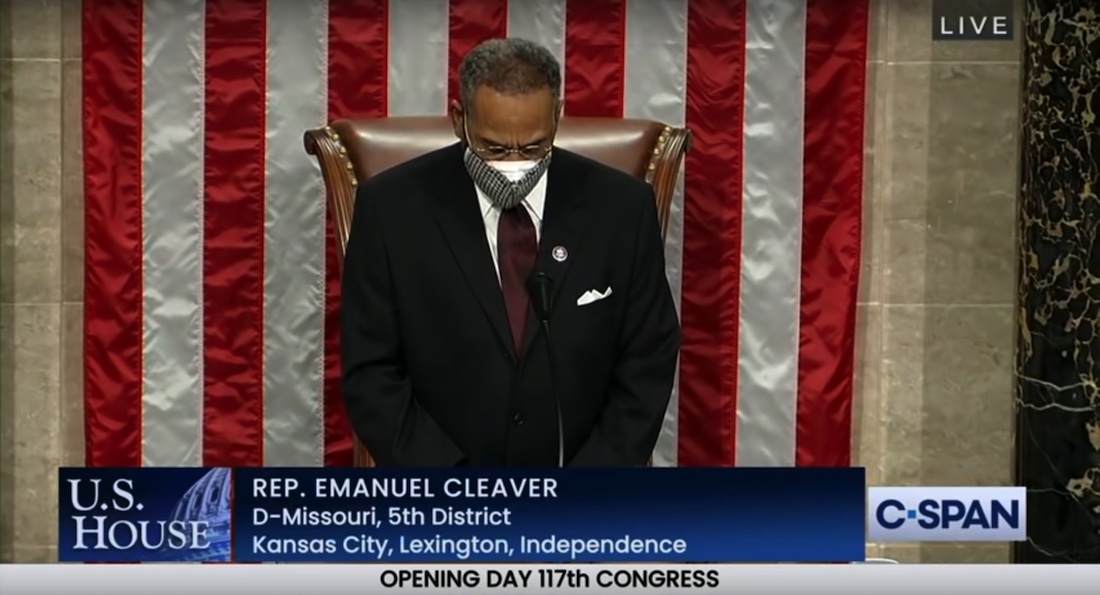There has been a lot of social media hubbub about Congressman Emanuel Cleaver’s recent prayer in the U.S. House of Representatives, which he closed with “amen and awoman,” apparently striving to be gender inclusive. He omitted atransgender.
Cleaver, D-Mo., is an ordained United Methodist who pastored a church in Kansas City for many years. His two-minute prayer was otherwise conventional, full of biblical references and King James cadences – until the very end, when he appealed to the “monotheistic God,” the Hindu creator deity “Brahma,” and the “god known by many different names and many different faiths.”
It is likely unique to Western liberal Protestants to strive for faux inclusivity in public spirituality. Jewish rabbis are not expected to pray to Christ. Imams are not expected to address the Trinity. Hindus probably won’t offer prayers to the Heavenly Father. A Methodist cleric should feel no need to pray to any Hindu deity, which likely no Hindu would expect.
Cleaver’s “awoman” prayer has been widely mocked. “Rep. Cleaver proposes increased U.S. aid to Yemen … or Yewomen,” tweeted one Methodist cleric. Another quipped: “I’m working on a new United Methodist Inclusive English Dictionary. It encourages people to alternate between words like ‘hurricane’ and ‘himmacane,’ and ‘hemorrhoids’ and ‘herorrhoids.’ Can I get an amen? How ’bout an awomen?”
“Amen,” of course, is derived from the Hebrew of the ancient Jewish Scriptures. It has no gender connection. It is simply a solemn affirmation roughly translated, “So be it.”
Cleaver’s prayer came amidst a proposal that the U.S. House of Representatives adopt new, gender-neutral policies avoiding references to “father, mother, son, daughter, brother, sister, uncle,” etc., in favor of “parent, child, sibling, parent’s sibling,” etc.
This current Western, secular fad for overturning gender bias has uncredited Christian roots. In Christ, “there is neither male nor female,” the Scripture affirms, demonstrating that all are equal before God. Egalitarianism is largely a Christian creation. Its insistence on universal human dignity is a great gift to the world. But the Gnostic pretense that biological reality can be surmounted by subjective thoughts and feelings leads to absurdity.
In Christian teaching, the male and female sexes are intrinsic to creation. They cosmically complement each other and are eternally woven into the metaphor of the marriage of Christ the Bridegroom with His bride, the Church. Gender-bending and gender denials are vain assaults on the created order.
Cleaver’s “awoman” prayer was likely not so ambitious. It was likely a more cavalier attempt at facile political correctness. After all, he still referenced a male/female binary, offending omnigender sensibilities. Its silliness and superficial syncretism nullified an otherwise stately prayer.
Some might declare that such prayers in civil pageantry are doomed to be shallow and, by extension, potentially sacrilegious. Some critics, both secularists and spiritual purists, prefer to eliminate prayer and religious lingo from state affairs. There are Christians who deride all civil religion as borderline blasphemy for rhetorically diluting true faith. They would be wrong.
The venerable tradition of civil religion dates to America’s founding and is a laudable effort to affirm a transcendent purpose for the nation and to allow religious citizens to share their faith publicly. It originally sought to be inclusive of all major Protestant sects and was sufficiently elastic to incorporate Catholics, Jews, and others. It is often Old Testament-focused, avoiding specific Trinitarian references. It speaks of a God Who presides over nations and their affairs watchfully, justly, and mercifully.
Civil religion guided the Founding Fathers, Abraham Lincoln, Martin Luther King Jr., and many others in attaching biblical purposes to their projects of uplifting humanity. It presupposes that God cares not just about our private and religious matters, but also about public issues and the affairs of state. God wants America to do better. This message is central to American identity, purpose, and endurance.
Christians, and presumably people of all faiths, would agree that civil religion does not substitute for personal redemption. Salvation comes specifically through Christ, Christians believe; other faiths have their own narratives. Civil religion largely avoids these issues and, while Protestant in origin, is inclusive without directly contradicting the theological specifics of most monotheistic traditions.
At the same time, clergy and other adherents are not expected to violate their own traditions when participating in civil religion. A Christian cleric is not required to pray to Brahma, and Hindus could not be faulted for scoffing at the attempt. A pluralistic society that affirms religious freedom for all can listen to clerics and others speak from their own unique faith perspectives at public events. The pageantry of civil religion does not require syncretism, theological pablum, or abandoning core convictions.
Rep./Rev. Cleaver, until his final words, prayed with all the dignity of his tradition, asking all to “bow before Your throne of grace” and “acknowledge Your sacred supremacy,” because “without Your forbearance we enter the New Year relying dangerously on our own fallible nature.” He asked God to “empower us with an extra dose” of democratic principles” and “refuel the lamp of liberty so that generations unborn will witness its undying flame.” He prayed that we feel “Thy priestly presence, even in moments of heightened disagreement” and that representatives’ deliberations be “unsoiled by any utterances or acts unworthy of this high office.” He admitted that we are all “soiled by prejudice and ideology” for which mercy is needed. And he closed by praying, “May the God Who created the world bless us and keep us,” and give us “peace in this land.”
There should have been a clear and final “Amen” right there. The few words he added only detracted from his otherwise admirable content. Civil religion aims to inspire solemnity, reflection, and reverence, not to invite ridicule.
Perhaps in his next prayer Cleaver will stress the “priestly presence” and cleave to the best of his Methodist tradition, in a chamber always in need of serious prayer.

